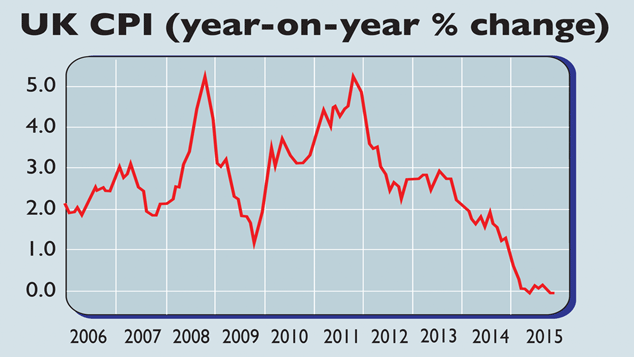
The annual rate of consumer price inflation (CPI) held steady at -0.1% in October, the lowest since 1960. Lower food and alcohol prices, and the effects of higher tuition fees dropping out of the annual calculation, offset the strongest October rise in clothing prices since 1997. According to Citigroup’s Michael Saunders, Britain is on track for its lowest annual inflation rate since 1933 this year: 0.1%. Core inflation, which strips out volatile food and energy prices, ticked up to 1.1% last month. Producer price inflation stood at -1.3%.
What the commentators said
Inflation has now hovered around zero for nine months, prompting concern over a possible gradual descent into a Japan-style, deflationary slump: falling prices make debt loads heavier in real terms, deterring investment and spending, causing more price falls and so on. But we’re certainly not experiencing this kind of “bad deflation”, as Maike Currie of Fidelity International noted in City AM.
The main reason for this bout of deflation is collapsing commodity prices, abetted by the recent strength in the pound, rather than a lack of domestic economic momentum that becomes self-perpetuating. For instance, there is no evidence of changing consumer behaviour. “No one is going to delay their weekly trip to the supermarket or stop filling up their car’s petrol tank because they expect prices to fall next month,” said Currie. “You need to eat and get to work.”
Indeed, this is a bout of “good deflation”, raising households’ spending power. Consumers are “enjoying real-terms wage rises after years of pain”, said Russell Lynch in The Independent. Wage growth near a six-year high, low unemployment and a healthy housing market all bode well for consumption, which comprises 60% of GDP.
In any case, inflation is likely to rise again soon, as the recent oil price declines drop out of the annual figures. According to Bank of America Merrill Lynch’s Rob Wood, petrol price inflation is set to climb from -14% to 0% by February.
Meanwhile, negative producer price inflation is unlikely to be enough to prevent core inflation climbing next year, said Samuel Tombs of Pantheon Macroeconomics: retailers are raising prices to make up for big increases in labour costs. CPI could thus reach the Bank of England’s 2% target by late 2016, “compelling” it to raise interest rates faster than the markets expect.